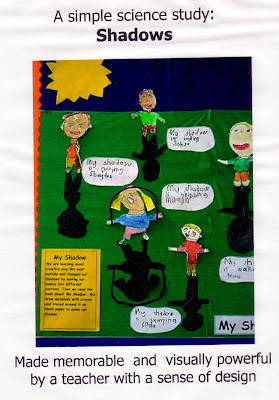
Entering this classroom a visitor cannot but be impressed by the celebration of students 'voice' or ideas. The young teacher, in a low decile school, has created an environment based on aesthetics and creativity. Her shadow study, a small thing in itself, has been made the most of.
'Children and scientists have much in common. Both are interested in a wide range of things and both are interested in, and attempt to, to make sense of, how and why things behave as they do'.
'Unless we know what children think and why they think the way they do we have little chance of making any impact with our teaching' write the authors of 'Learning In Science' ( Osborne and Freyberg).
Student centred classroom ought to reflect students questions, theories, 'prior ideas', points of views, and ideas they have modified as a result of learning more.
All too often this is not the case. Worse still teachers' intentions and language gets in the way. As well there is simply too much time spend on literacy and numeracy that also gets in the way of tapping into students' curiosity. Even the, hardly 'new', emphasis on key competencies may divert teachers away from the valuing of student's ideas.
Teaching ought to be about reflecting students diverse idea and helping them clarify and extend their thoughts. It ought to be about providing students feelings of satisfaction and power which comes from being able to do something.
Students are perfectly capable of making meanings for themselves. the teachers role is to value their 'prior ideas' and then to help them clarify and deepen their understandings. Disconcertingly students view are sometimes hard to change - this is the dilemma of the traditional teacher.
Students have idea to express ( and to be challenged) about an infinite range of experiences.
How do plants grow? What are seeds? What are Flowers for? What are fruits or vegetables?
How are animals, like cats, dogs or goldfish, suited to live their lives? What things are alive? What is an animal? Are we animals?
Why do we need food? Where some food good or bad for you? Why do things taste differently?
Why do some things dissolve, melt, freeze and why?
What is air? How does smell get from a air freshener to our noses? What is wind? Where does it come from? Why do kites , or birds fly?
Why is water important? Where does it all come from, or go to? Why does it freeze or melt? What does soap do? How are bubbles made? Why do some things sink or float? Why do boats float? Where do waves come from -what makes the waves?
What is electricity? What is a battery? How does it get into our homes?
Where does all out toilet water go to? Where does all the storm water go to? What is rain? Where does it comes from, or go to? Why do puddles dry up in the sun?
How do we keep warm? How do we keep things warm? What is a thermometer
What is light? Can it go around corners? How are shadows made? Why do they change during the day?
How do musical instruments make sounds?What is vibration? How do we hear?
Why do things fall down and not up? Is the world round or flat? How do you know? Why do season change? What is the sun, the moon, or the stars.
What is wood, rocks, soil , dirt?
Why do we get sick? Why do medicines work? What is inside our bodies? Why do we have blood, veins, bones , hearts? Why do we get old and die?
A great idea would be to ask students, of any age, what are the question and concerns they have? From such an activity an 'authentic' curriculum would emerge' that teachers and students could explore ( co-create new knowledge) together.
Looking at the above list it is hard to know if they are science, language, literacy, numeracy, philosophy, technology, social sciences, or art. To solve them would involve all disciplines.
We need to consider how to integrate literacy and numeracy into such an 'emerging' and creative curriculum.
Students could be asked to think of ways to explore their ideas and ways to express them. In this process 'learning how to learn' ('key competencies') would naturally be involved.
This is true learning - all about 'changing ones mind'.
It is what ought to happen in our schools. It is how we learn in life - or at least the very young or those who get through our system to become scientists.
Imagine a school based on exploring students curiosity.
Imagine the exciting role of the teacher!
Schools have a lot to learn about learning
2 comments:
Great practical ideas to explore with my class. Thanks.
I totally agree with you about those tips. Actually, I think everyone should use them. Thanks for this, I'll also dig in your older posts for some great ideas like that!
Post a Comment